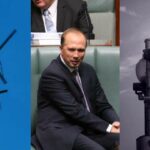Home Affairs Erodes Oversight to Spying on Citizens, Warns NSWCCL

As home affairs minister Karen Andrews delivers further national security amendments that would serve to extend the reach of intelligence, it’s becoming clear as to why the ex-industry minister stepped into the shoes of former department head Peter Dutton.
On 25 November, Andrews introduced the National Security Legislation Amendment (Comprehensive Review and Other Measures No 1) Bill 2021, which is based on the findings of the Richardson Review, which were publicly released in late 2020.
In her second reading speech, the minister outlined the review “recognised the need for a number of targeted reforms to ensure our intelligence agencies can continue to protect” public safety and security whilst “recognising that their extraordinary powers require extensive oversight.”
Andrews then sets out that the legislation will cut down on authorisation red tape for agents, including when ASIO and international spying agency ASIS cooperate overseas, as well as increasing the time that local agents can withhold citizens’ and noncitizens’ travel documents.
In its submission on the bill, the NSW Council for Civil Liberties (NSWCCL) has provided a set of recommendations to tighten its provisions, which the council asserts currently lead to junior staff making emergency decisions, whilst further criminalising unwitting citizens and silencing journalists.
The feast continues
“The Council for Civil Liberties does understand, and, to an extent, supports the government’s stated aim,” lawyer Pauline Wright made clear, “and the need for intelligence and law enforcement agencies to investigate serious offences and to obtain intelligence on security threats.”
“But we’re concerned that the proposed amendments are going to carry undesirable consequences,” the NSWCCL president told Sydney Criminal Lawyers.
According to Wright, laws within the bill permit international intelligence collection agencies to surveil Australians over potential connections to listed terrorism agencies that could result in being criminalised for the mere participation in a “lamington drive” or a “sausage sizzle” to raise money.
The liberties advocate further explained that these measures have “the potential to limit the freedom of journalists and media organisations and to inhibit the provision of information to the public”, as reporting on such entities might be taken as tacit approval.
“A journalist could be seen to be supporting a terrorist organisation with their words, even if they’re supporting just one aspect of its philosophy, for instance,” Wright continued. “It’s just not tightly defined enough. There’s real potential for overreach.”
Other key encroachments
Proposed section 9D of the Intelligence Services Act 2001 (Cth) empowers an agency head to delegate decision-making authority on producing intelligence regarding an Australian overseas to staff if “there is, or is likely to be, an imminent risk” to the subject’s safety, without informing the minister.
Inserted subsections 8(1A) and 8(1B) seek to limit the requirements for Australian international spying agencies to obtain ministerial approval to produce intelligence on an Australian person so that it only pertains to the use of covert or intrusive methods.
These foreign intelligence collection agencies are ASIS (Australian Secret Intelligence Service), the ADS (Australian Signals Directorate) and the AGO (Australian Geospatial-Intelligence Organisation).
Another intrusive provision is contained within proposed subsection 13B(3) of the Intelligence Services Act, which would remove the requirement to seek approval of the head of ASIO, when the domestic intelligence agency and ASIS jointly spy on an Australian overseas.
While schedule 5 of the bill would amend the Crimes Act 1914 (Cth) to extend an agent’s ability to assume an identity when investigating or gathering intelligence regarding criminal activity to the ASD. This provision currently only applies to ASIO, ASIS and the ONI (Office of National Intelligence).
Dwindling oversight
The removal of the need for independent senior authorisation is a pattern that’s been apparent within the numerous national security and counterterrorism bills that have been passed over more recent years. This is both in terms of ministerial approval and that of the courts.
Wright warns that when covert activities potentially encroach upon the rights of Australians the authority of the courts or the minister should be sought otherwise there remains a complete lack of oversight in relation to whether these “extraordinary powers” are ethically exercised.
Intelligence agents aren’t answerable to the public like a government minister is, the NSWCCL president explained. Therefore, a “conflict of interest” can exist, whereby an individual can simply sign off on spying activities that serve their own purposes.
“The ability to self-authorise the collection of intelligence should be highly controlled, if allowed at all,” the lawyer underscored. “This bill would allow delegation to even junior members of staff to authorise certain activities in emergency circumstances. That’s completely unacceptable.”
A recent example of where similar changes have resulted in less oversight was seen with the passing of the 2020 ASIO amendment, which has provided agents with the ability to simply seek internal authorisation within the domestic spying agency, rather than the earlier court required approval.
The sun never sets on terror laws
The Andrews laws are only the latest in a long line of national security and terrorism measures that have been enacted at the federal level in the wake of the 2001 9/11 attacks in New York. This legal edifice now consists of over 90 separate pieces of legislation.
The NSWCCL has been warning that these laws, which have been pushed through with bipartisan approval, may be presented to the public as a means to foil terrorists and criminals, yet they actually serve to erode the rights of all Australian citizens and residents.
“After the initial raft of these laws that grant extraordinary powers to police and intelligence services in Australia were passed, rather than winding them back once the immediate threat was over, as was promised, the powers have been added to incrementally,” explained Wright.
The lawyer added that this has led to such draconian measures being “normalised”, whilst they serve to strip the “fundamental rights and liberties” of all of us.
“There is a high degree of secrecy adopted by the federal government and its agencies at the moment,” she stated in conclusion, “which is leading to a public lack of faith in the accountability of the powers that are being exercised over them and their data.”







